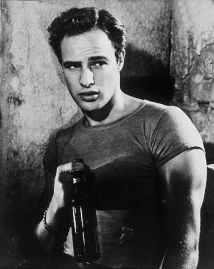 I don’t know about all artists, but some seem only to thrive within an intimate audience. After Mark Twain’s wife died, he never finished another book.
I don’t know about all artists, but some seem only to thrive within an intimate audience. After Mark Twain’s wife died, he never finished another book.
The number of art school students who surrendered art abruptly upon leaving school is significant, which I connect to this loss of audience. I’ve heard some explain that they quit art or writing because art school drained their creativity. That’s possible in particular cases. But I think it’s equally possible that people lost their inspiration when the artistic dialogue failed, when they no longer had other artists around them every day.
 Tennessee Williams is an example of an author who lost his inspiration along with his lifetime partner. While his partner was alive, Williams wrote plays like “A Streetcar Named Desire,” “The Glass Menagerie” and “Cat on a Hot Tin Roof.” After his partner died, Williams wrote plays like “The Red Devil Battery Sign.”
Tennessee Williams is an example of an author who lost his inspiration along with his lifetime partner. While his partner was alive, Williams wrote plays like “A Streetcar Named Desire,” “The Glass Menagerie” and “Cat on a Hot Tin Roof.” After his partner died, Williams wrote plays like “The Red Devil Battery Sign.”
*Sigh.*
In 1980, when I encountered him, Tennessee Williams may have lost much of his playwriting mojo, but he still had enough fame and literary cache to land him a temporary position as writer-in-residence at the University of British Columbia creative writing department, a position he held for a moment and three-quarters while a fresh rewrite of “The Red Devil Battery Sign” was being produced at the Vancouver Playhouse.
I remember an interview with him being published in the Vancouver Sun at the time, a little fawning, a little silly, which shamelessly exaggerated his Southern accent. Mr. cultured-and-charming Southern gentleman. The actual Tennessee Williams, which I admit I only briefly met, was rather more nuanced and humanly charming.
In 1980, he had already long ago written any play worth remembering him by. No rewrite could save “The Red Devil Battery Sign.” But he’d already done more than his literary part and was entitled to cruise on his celebrity for as long as people wanted to make a fuss over him.
I remember the students in the creative writing department were presented to him in an expanded classroom, more than one class brought together in that room. He entered with a faculty entourage, and quietly entering with him, saying not a word the whole time and sitting on chair behind the eminent author while the proceedings went on, was a very pretty young man who nobody bothered to introduce or refer to. Tennessee’s date.
I suspect that young man felt a little lost.
As for Tennessee, while I do remember him talking, I don’t remember what, if anything, he had to say about writing. What he did instead was something which cemented him firmly into the biographies of everyone in the class. He wrote a story with us.
Tennessee sat at one end of the table and wrote the first paragraph of about 100 words. The person next to him wrote the second paragraph based on what Tennessee had written. So on for the next person. The story progressed around the table from Tennessee Williams to me, each person only aware of the paragraph before and of what they themselves had written. After we each had done—I forget exactly how long we were given to complete our parts—we each read out our paragraphs in sequence.
Williams began the story. I ended it. It must have been 2000 words produced by 20 hands in less than an hour, and it actually was not that bad a story. Although I can’t recall a single detail, a single word, or the slightest notion of what it was about, I remember being impressed and surprised by how well it held together.
But it was pure ephemera. The story only had one reading. All the people in that room took their paragraphs home and nobody ever made the attempt to reassemble them again. I lost my own paragraph long ago.
Still I can say it. I wrote a story with Tennessee Williams.
 Okay, I know it wasn’t a profound literary encounter, but I’m reminded of the story of the guy whose job it was to dress up like a clown and follow the circus animals around with a shovel and bucket. After complaining about it as he did practically everyday, somebody asked him why he didn’t just quit his job.
Okay, I know it wasn’t a profound literary encounter, but I’m reminded of the story of the guy whose job it was to dress up like a clown and follow the circus animals around with a shovel and bucket. After complaining about it as he did practically everyday, somebody asked him why he didn’t just quit his job.
“What, and give up show business?” he asked.
My encounter with literary greatness might be trivial, the literary salon equivalent of a parlor trick. But what Tennessee gave me, and the rest of us who were there, was a share of what he still had, a share of his celebrity. And like the lowly clown on doo-doo patrol, as for me, I’m not giving it up, oh no.


Christine
July 3, 2012
Love the story – thanks for sharing it. Do you have a copy of the story? That would be interesting, too.
fathertheo
July 3, 2012
Unfortunately lost.
Christine
July 3, 2012
Well, it was a few years ago, so it’s not all that surprising. I often can’t find a paper I had earlier that day. 🙂